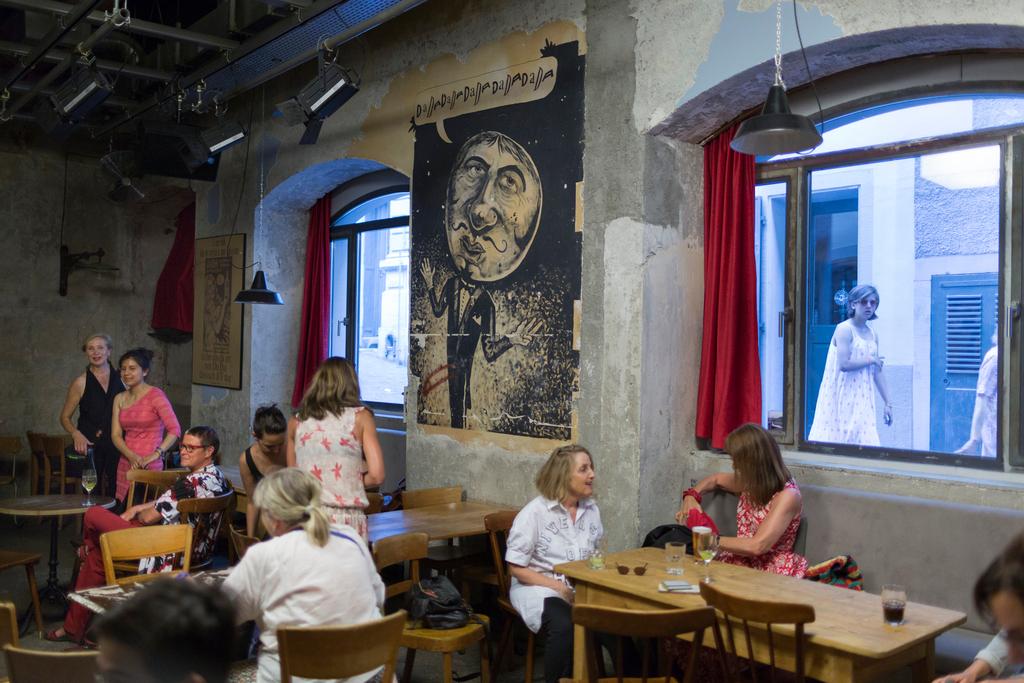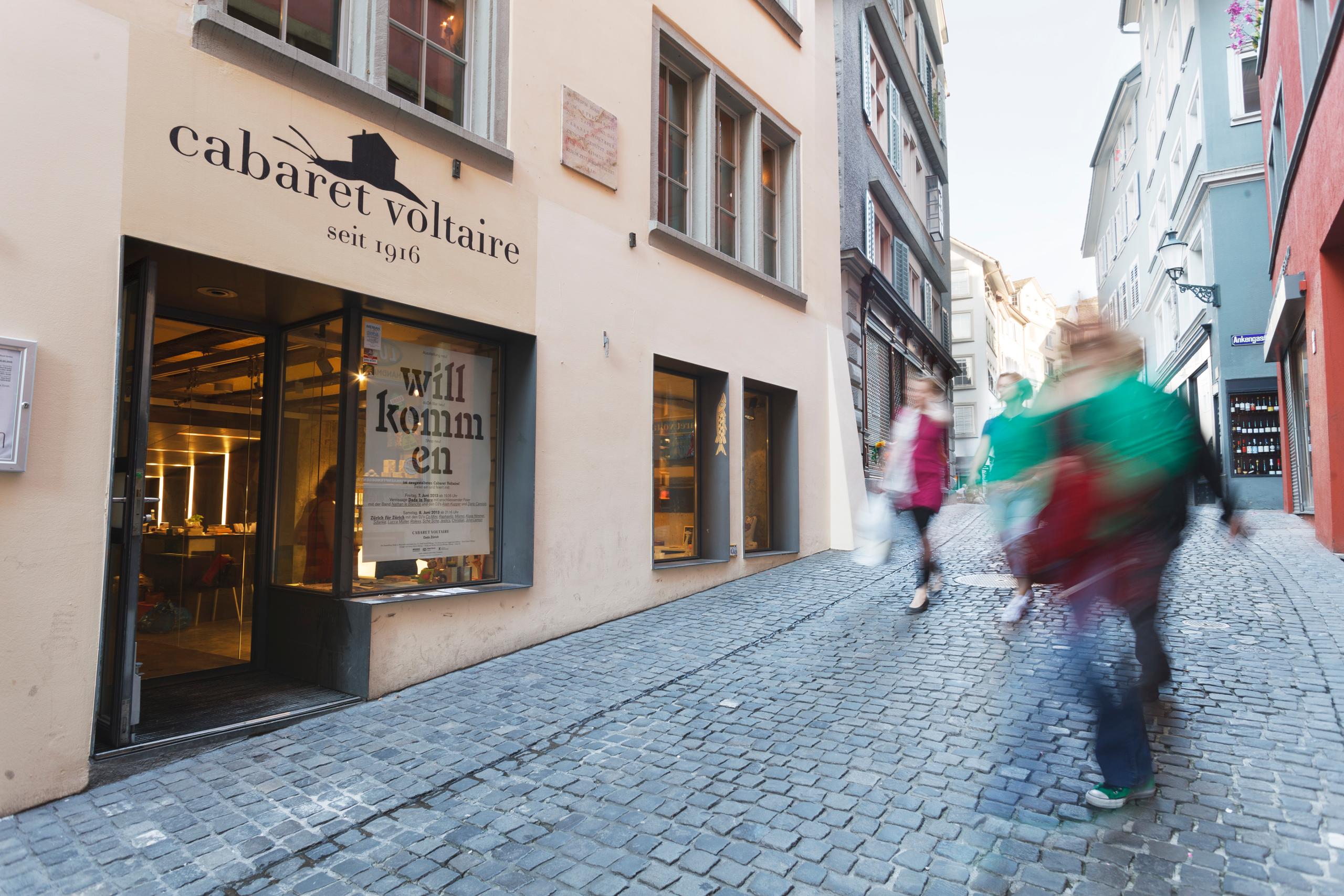
Home of Dada up for sale for CHF13m

The alternative Dada art movement faces a financial fight for survival. The answer to the problem: turn its Zurich birthplace into a work of art and find a collector who will buy it for the princely sum of CHF13 million ($12.8 million).
That’s the reserve price that has been slapped on Cabaret Voltaire in a bid to secure Dada’s future during its centenary year. Now it is just a question of finding a deep-pocketed art lover who can envisage the unassuming building, nestled among cobbled side streets in Zurich’s old town, as a sculpture or oil painting.
The novel idea was the brainchild of Swiss artist Kerim Seiler. Cabaret Voltaire director Adrian Notz is convinced that it will not only solve Dada’s immediate financial problems, but will also allow the birthplace of the provocative art form to flourish free of future economic restraints and political bickering.
“It would be nice to have the sculpture as a residence for artists who would also run it and open it up as a more international venue. That would be a very strong gesture for art. The art market is so crazy at the moment it might actually work!” he told swissinfo.ch.
Any future benefactor, as yet completely unknown, would be expected to buy into the Dada movement and not just convert the building into apartments. “You would not buy a Van Gogh, cut it up and make a carpet out of it, because you know it’s an art work,” said Notz. “In the same sense, you would not want to change anything in Cabaret Voltaire.” The plan is for a future owner to permanently loan the building to Dada artists.
The theatre was, after all, reborn as the home of Dada in 2002 (reopening properly in 2004) precisely because it was the very spot where anti-war artists Hugo Ball and Emmy Hennings started the movement in 1916.

More
Dada: artists’ response to WWI
Financial burden
Kerim Seiler says he wants to “re-programme” people into perceiving Cabaret Voltaire as an “historical monument”. “It should not be about who owns it. It’s not a piece of material, a tool for making money,” he told swissinfo.ch. “It’s a place where a couple of migrants [Ball and Hennings] did things that changed our perception of existence.”
Selling Cabaret Voltaire to an art collector may sound to some people idealistic, and perhaps unrealistic, on the surface. But it might not necessarily be just a pipe dream or a publicity stunt. Eight years ago, a wealth Swiss art lover did express an interest in buying the theatre. The financial crash put paid to that proposed deal, but it proved to Notz that the concept was worth reviving.
But why the need for such a drastic and ground-breaking move? The building is owned by insurance giant Swiss Life which charges CHF315,000 rent annually. The non-profit enterprise burns roughly CHF500,000 more in running costs each year.
Swatch’s CHF300,000+ sponsorship ended several years ago and money from cultural foundations has all but dried up. “Dada is not the right image for banks, and it is difficult to find sponsors in general in the current economic climate,” said Notz. “Swiss foundations are focused on Swiss artists and projects. Dada was born here, but it’s not very Swiss. Despite this, we manage to get some support from foundations.”
Sex slaves and “scandals”
Zurich city council pays Cabaret Voltaire’s rent, but not without a fair amount of political opposition from the conservative right Swiss People’s Party. They are not too fond of taxpayers’ money being spent on the home of such provocative acts as the live casting of sex slaves and a couple whose performance included urinating on each other.
The People’s Party launched an unsuccessful initiative in 2008 that called on voters to veto the council decision to financially support the venue. And they did not mince their words in a 2013 postulate protesting plans to help bankroll Dada’s centenary jubilee.

More
Dada: the art movement that questioned everything
The postulate condemned CHF4 million of city funds spent between 2003 and 2013 on reviving Dadaism in Zurich, resulting in “ten years of flops, scandals [and] fleeing sponsors”. Dadaism is described as “absurd”, “laughable”, “nonsensical” and “embarrassing”. It’s initial anti-war platform amid the bombs and gas of 1916 was little more than a fig leaf that has since fallen away completely, according to the postulate.
Dada may seem outrageous to some, but it does not provoke merely for the sake of it, counters Notz. It seeks to challenge stereotypes and remind people that there is life beyond the conformity demanded by the establishment.
Dada zeitgeist
Caught between cold reality of market forces and the heat of abrasive politics, Cabaret Voltaire needs to break free in order to survive and flourish. A successful crowdfunding scheme raised CHF100,000 for the centenary celebrations, but Notz does not think this is a sustainable option apart from occasional special projects.
The theatre does make money from running a shop, a bar and renting out space for artistic performances, birthdays and weddings and corporate Christmas parties. But not enough for financial independence. A wealthy, art loving patron is therefore required to give the home of Dada breathing space as it looks to the next 100 years.
“If you talk about Dada as a zeitgeist it does not depend on this place,” said Notz. “But people being people, they like to identify Dada with a space.
“It would not be a disaster for Dada if Cabaret Voltaire went out of existence, but it would be a disaster for Zurich. Even if other places identity with Dada, such as Paris or Berlin, there can only be one birthplace.”
Of course, the revolutionary idea would only work if Swiss Life agrees to sell the building housing Cabaret Voltaire. “It’s understandable that the house is the subject of creative thinking during this Dada centenary year. Nevertheless, we are not getting involved in any speculation,” the insurance company stated.
The Dada artistic movement was founded in Zurich by a group of artists led by Hugo Ball and Emmy Hennings in 1916. Cabaret Voltaire was set up as a venue for Dada art and performances. The theatre ran into disrepair and was saved from demolition in 2002 by a group of artists, led by Mark Divo, who illegally occupied the building to prevent its destruction. It opened for business again on September 30, 2004, complete with a subsidy from the city.
Dada was initially an artistic expression of protest against the horrors of the First World War, rejecting established conventions with an anti-aesthetic and often shocking style. There are various interpretations of how the movement got its name, with many believing it was just a nonsensical word chosen to display the movement’s contempt of logic. It swiftly spread throughout Europe and the United States and was at its peak between 1916 and 1920.
Officially launching on March 5, the movement’s 100th jubilee celebrations will be marked in Zurich with a series of exhibitions and performances throughout the year.

In compliance with the JTI standards
More: SWI swissinfo.ch certified by the Journalism Trust Initiative
















![The four-metre-long painting "Sonntag der Bergbauern" [Sunday of the Mountain Farmers, 1923-24/26] had to be removed by a crane from the German Chancellery in Berlin for the exhibition in Bern.](https://www.swissinfo.ch/content/wp-content/uploads/sites/13/2025/12/01_Pressebild_KirchnerxKirchner.jpg?ver=cb688ed5)















You can find an overview of ongoing debates with our journalists here . Please join us!
If you want to start a conversation about a topic raised in this article or want to report factual errors, email us at english@swissinfo.ch.